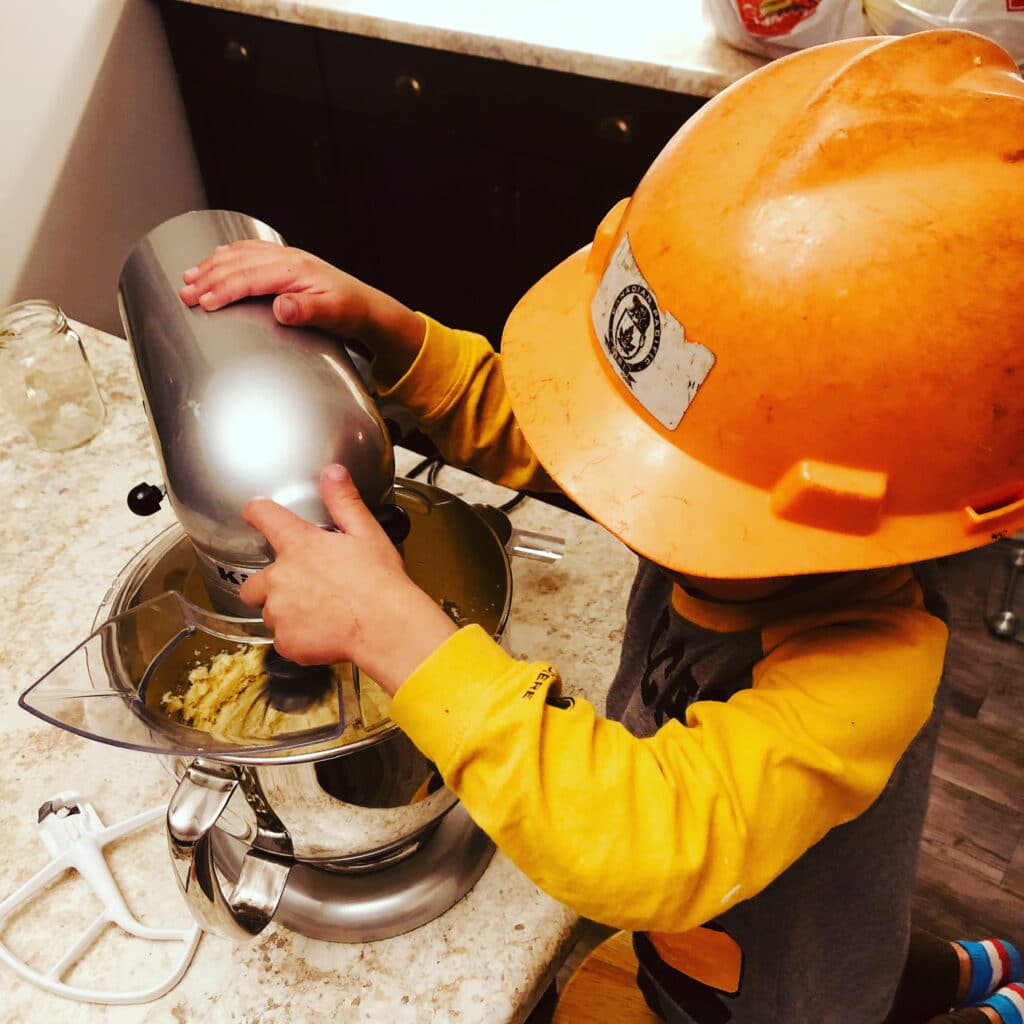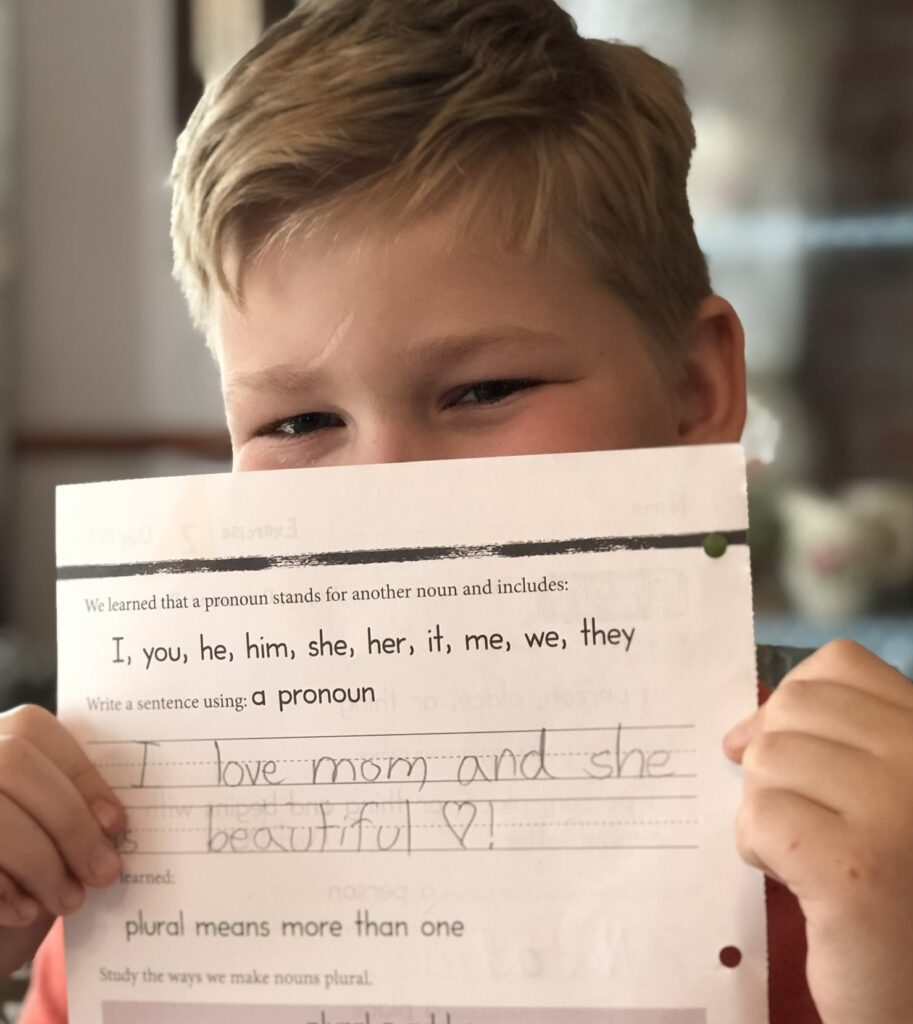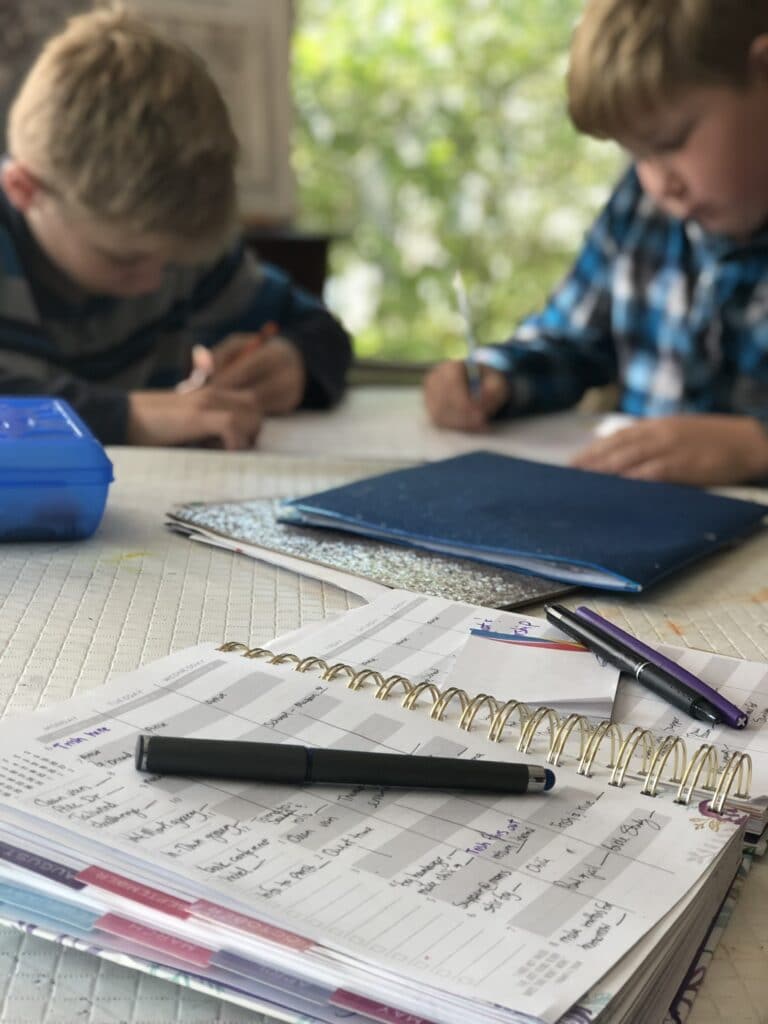Encouragement for Homeschool Moms: 7 Things to Remind Yourself of When You’re Overwhelmed
Most any parent that has been homeschooling for a while will tell you: home education is not for the faint of heart and can feel overwhelming at times! Encouragement for homeschool moms is crucial whether you are an experienced homeschooler, or this is your first year. Read on for 7 important things to remember when homeschooling feels hard.
This post may contain affiliate links for products or services that I personally use and recommend. When you make a purchase through any of my links I may earn a commission at no extra cost to you. Read my full disclosure here.
A Confession from a Veteran Homeschooling Mom Who Needs Encouragement Just Like You Do
I have a confession to make. Although our family has been homeschooling for almost a decade, and even though I grew up in a homeschooling family, educating my children at home does not always come easily for me. You could even say that, initially anyway, I was a reluctant homeschooler. Some days are just really hard, and I have to remind myself that hard does not mean bad.
Hard does mean that I’m going to need some solid reasons to keep going, and encouragement that this marathon of home education is the right race for me to continue running. When homeschooling is overwhelming, I need some lifelines to grab ahold of!
Chances are, if you’ve been homeschooling for a while, you can relate. And if you are a new homeschooler this year, you may find out quickly that it does not come easily for you, either. That doesn’t mean that it is not the right choice for your family, or that you are not qualified to take on this momentous task.
It does means that there will be days ahead when you may doubt your decision and even feel like plopping down in a pool of tears and quitting right there on the spot. At those times, you’re going to need encouragement to keep going.
From one homeschooling mom to another, I want to share with you some things that have helped me to keep going through the ups and downs of the school year. Whether you are a veteran homeschooler, or a newbie, I hope this post will be the encouragement you need to keep pressing on.
Encouragement for Homeschool Moms: 7 Things to Remember When You’re Overwhelmed
1. Remember your why.
When our family started on our homeschooling journey with my then 4 and 5-year-old boys, there were several homeschooling families in my rural area. Over the next few years, several of those families decided homeschooling was no longer for them. Seeing others change course was disheartening for me, and as a mom, I certainly had moments when I second-guessed whether I had what it took to keep going, or whether I was truly the best teacher for my children.
My resolve to educate my children at home was further tested as my son’s special needs became more and more evident. But I knew my “why” for homeschooling, and that kept me going when I felt like I was in water far too deep, and everyone else was headed to shore.
For our family, one of the main reasons, though not the only one, for choosing to homeschool was so that we could give our children a solid Christian education. Keeping that “why” in my heart kept me going even on the tough days. And believe me, there were plenty of them! Which leads me to my next point:

2. Homeschooling is hard (most worthwhile things are!).
There will be moments when you desperately want to quit, times when you can’t teach because you’re sitting in a messy puddle of tears, and days when your strength seems all but gone. Being a home educator takes a huge dose of commitment, patience, and, most of all, grace.
Grace from God to us, grace that we extend to our children, and grace towards ourselves as we face our own painful failures and inadequacies. There will be times when the books need to be pushed aside, and everyone, mom included, needs to go outside and play in the sunshine. And that’s fine because homeschooling is about much more than just “book learning.” We are learning for life, including teaching our children how to deal graciously with demanding days and situations that aren’t going at all as we planned.
Yes, homeschooling is hard, but most worthwhile things are. And, right in the middle of the most challenging moments, you will find God’s grace, abundant and free, and learn that when you are weak, He is strong. Which brings us to the third thing we need to know:
3. You don’t have the patience to homeschool (that’s why you need God).
If only I had a dollar for every time someone has told me, “I would love to homeschool, but I just don’t have the patience for it!” Or perhaps even more honestly, “I could never homeschool – I’m just not a patient person!” Every parent knows how much patience parenting takes, and every school teacher knows how much patience teaching takes! When you are homeschooling, you are both the parent and the teacher (and the principal – the buck stops with you!). Yet, I’ve never heard even one homeschooling parent say, “Oh yes! I’ve got a ton of patience! In fact, that’s precisely why I decided to homeschool!”.
As Christians, we understand that patience is a fruit, or evidence, of God’s Spirit working in us and changing us. Think for a minute about what some of the other fruit listed in Galatians 5 are: love, joy, peace, kindness, and the list goes on. What if someone said. “I would love to _____but I’m just not kind enough” or “I could never do_____; I’m just not gentle enough”. We can understand that those are areas where a person needs growth. And it’s the same for patience (also translated in the Bible as longsuffering or endurance). Not having enough patience isn’t a bad thing at all if it drives us to acknowledge our desperate need of the Spirit of God changing and remaking us into the people He designed us to be. Now, lest I discourage you instead of encouraging you, I need to remind you that:

4. Homeschooling is a ton of fun.
Say what? Did I just contradict everything else I said? Not at all. Just because something is hard and requires patience, grit, and grace does not mean that it is not also full of potential for delight.
Think of most anything worthwhile that you have ever learned: a musical instrument, a sport, a craft skill, a tough but fascinating college course. Hard work? Yes! Tenacity required? Absolutely. Fun – possibly, but that’s entirely up to you. And it’s the same with homeschooling.
Here are a few delightful things about homeschooling: Listening to your child sound out words for the first time. Giggling together over a silly song you made up together to help remember grammar rules. Watching their eyes widen as a new concept finally clicks. Feeling pretty smart because you just learned a fascinating historical fact that fits like a puzzle piece into current events you’ve been following. Having the flexibility to take the morning off to go on a nature walk together or to visit a local museum on a whim. Reading a chapter book together and getting just as immersed in the story as your children.
Remember, your attitude is contagious! If you are ho-hum about the school day, or your kids hear you complaining about having to teach them, they will pick up on it fast. They will also pick up on it fast if you are excited and enthusiastic about being their teacher! Keep a sense of wonder as you teach and learn alongside your children, and you’ll find the mundane becoming spectacular. Remember, you are aiming for cheerfulness and enthusiasm, not perfection, because:
5. There is no perfect homeschooling family.
There never has been, and there never will be. That includes your family. Phew! Now that the pressure is off, you can take a deep breath.
More Homemaking Posts You’ll Love
Many parents enter into homeschooling with so much enthusiasm and excitement. They’ve spent hours upon hours poring over glossy homeschool curriculum catalogs and vibrant websites, full of pictures of beautifully posed, happy children studiously bent over their workbooks, while a poised, smiling mother serenely supervises nearby, steaming cup of coffee in hand.
Of course, no curriculum company would ever put a picture of a frazzled mom attempting to help one child with a complicated math question while simultaneously wiping up spilled milk from her helpful toddler who decided to pour his own sippy, while her cold-again coffee sits forgotten in the microwave. That true-life picture probably wouldn’t be great for sales.
Social media can also skew our concept of what we think our homeschool setting should look like. Search popular homeschooling hashtags, and you’re likely to see more beautiful pictures with nary an exhausted mom or frustrated child to be seen.
In this age of filters and false glamour everywhere, it’s so easy to fall into the comparison trap. Please don’t! Comparing yourself to others is never healthy. You’ll either end up feeling like an utter failure, find yourself judging those who seem to be doing less well than you, or tottering erratically between those two places yet never experiencing contentment and joy. Give yourself (and your family) time to grow together. Learn from others, but don’t compare yourself to them. And speaking of learning from others:

6. Seek out others for advice and support
Veteran homeschoolers can have a lot of wisdom to share! Ask anyone who’s been homeschooling for even a little while, and they’ll tell you some things they learned the hard way, areas they needed to adapt in, stuff that needed to go, and neglected things that needed to be added in.
Don’t be afraid to ask other homeschooling parents for their tips; most if not all will be very happy to chat. But remember, just because someone shares advice with you doesn’t mean you are obligated to follow it. Good and wise people can have very different opinions about the very same things, such as the ideal method or philosophy of home education (online, Charlotte Mason, Classical, Unit Studies, etc.). Glean wisdom from a variety of sources: parents who have homeschooled for years and have children who have graduated, families with children similar in ages to yours, and others new to homeschooling who are freshly researching options and have some helpful finds to share with you.
And this is extra important: If you are homeschooling children with special needs, it is especially crucial to seek out support from other parents of children with disabilities, as well as resources for special needs families (HSLDA is a good place to start looking as they have special needs consultants ready to assist your family). Homeschooling children with special needs can feel extra hard and lonely, but it doesn’t have to be that way. Encouragement for homeschool moms of children with special needs or disabilities is out there! This blog is one resource, and you can sign up for my monthly newsletter, Refresh, to get a lovely dose of uplifting inspiration each month!

Join Our Monthly Newsletter
And get refreshment sent
straight to your inbox!
Ultimately, the decisions you make for your family rest on you and your spouse to make, and you must do what you believe is best for your family. You may not get it exactly right the first time, and that is just fine. That’s one of the beauties of homeschooling: you can be flexible and adapt your learning plan and even curriculum as you go along to find what is most suitable for your family. You’ve got time to figure out what works best for your children, because after all:
7. Homeschooling is a marathon, not a sprint.
Burnout among homeschooling parents is a real thing. Pace yourself. Decide ahead of time what core subjects and extracurricular activities you want to focus on. Especially if you are teaching multiple ages of children at the same time, simplicity is key. Once your family has established a good routine that is working (at least most days!), then you can absolutely look into adding more things in (art class, anyone?!), but don’t try and do it all right from the beginning. You may find that you are doing tons of stuff, but not doing any of it well.

I hope that keeping these seven things in mind will be helpful to you as you begin a brand new school year. Remember, you are uniquely qualified to give your children an excellent education. You know them better and love them more than anyone else on this planet. Know your why, remember that you can get through the hard days with God’s grace, learn from others but don’t compare yourself to them, and pace yourself for this incredible marathon ahead of you. You are going to be just fine, and I’m cheering for you!

For more resources, I highly recommend checking out these helpful sites:
Christian Book is a one-stop-shop for all things homeschool. This is where I do almost all of my homeschool shopping! Affiliate link.
The Homeschool Legal Defense is a wonderful resource for everything from the legal aspects of homeschooling to advice for educating children with special needs and everything in between.
Here’s a peak into what our homeschool looks like this year (2024/2025):
This year, we are homeschooling our three oldest children, ages 9-14. My oldest son requires mostly one-to-one instruction due to his disabilities, including severe apraxia of speech and autism. We use a variety of workbooks and lots of tactile learning tools for him as he requires tons of repetition before a concept sticks and become another building block in his functional understanding of concepts. We also get support for a few hours each week through our local school. My second son is a 7th grader and is a typical learner with a few extra challenges, but he does well at school when he’s able to stay focused. We source our curriculum from a variety of companies, including CTC for online math and The Good and the Beautiful for Language Arts. My third/fourth-grader son excels at math, and we will be using CTC online math again this year. For language arts we are using The Good and the Beautiful, and we are using Gather Round for our science and social studies program. Our youngest son is enrolled in a KinderPlus program for children with special needs through our local school. As a family, we have a strong emphasis on reading living books, both individually and together as a family, and we strive to keep learning fun by incorporating plenty of games and activities throughout the day.














The greatest joy for me from homeschooling is to see my children master the concepts and then go on to higher education! Our homeschooling is getting less hectic as we have only 2 left. I’m so thankful that by God’s grace our children have been prepared for college and are excelling there. It makes all those days when I wanted to call it quits worth it (and there were many). Now one is on to doing his own teaching! Amazing to see how the marathon plays out. Thank you Cara, for the encouragement and for keeping at it for the good of your children. I am praying for you.
Thank you, Linda, for your comment! It means so much to hear encouragement from those who are farther down the road of homeschooling. Thank you for your prayers; I need and appreciate them!
Thanks for the encouragement! Giving our children a solid Christian education is definitely the biggest “why” for me, too.
Thanks for the reminders and encouragement after a hard week of life and homeschooling. Loved seeing the pics of your boys in this post.